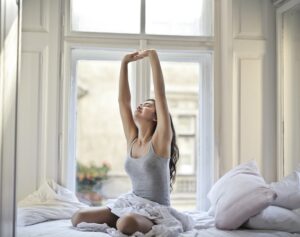Do you ever lie in bed and stare at the ceiling, unable to fall asleep? Consider your sleep hygiene and how your habits may prevent you from getting the quality sleep you need if you need better sleep. Let’s talk about sleep hygiene and how adjusting your daytime and nighttime routines can help you rest better.
What is “Sleep Hygiene?”
In this context, “sleep hygiene” refers to regular, restful sleep practices. Getting enough good sleep is essential to maintaining proper mental and physical health and high quality of life, so practicing good sleep hygiene is vital.
The quality of your sleep may be affected by your actions throughout the day, not just before bedtime. Besides what you eat and drink and when you do it, many factors impact your sleep quality.
CBD is the second most common chemical in the cannabis sativa plant, and many studies suggest that it may help with sleep. Research suggests that CBD, which has virtually no psychoactive effect, could help people with sleep disorders like insomnia and restless leg syndrome, as well as other conditions known to make it hard to sleep.
For example, CBD often helps people relax by making them feel less anxious and less in pain. Anxiety and pain can make it hard to fall or stay asleep.
Insomnia
The hypothalamus is involved in sleep-related things, such as controlling body temperature and coordinating sleep patterns. CBD can help people with trouble sleeping because it helps the hypothalamus control stress. In a study on how cannabis affects insomnia, researchers found that CBD was more effective than delta-9 THC at reducing insomnia symptoms.
The Circadian Rhythm
Circadian rhythm disorders, also called sleep-wake cycle disorders, happen when the body’s internal clock, which controls when you sleep and wake up, is out of sync with your environment. Circadian rhythm disorders can occur when your sleep schedule changes, which can happen when you travel or start a new job. They can also be caused by a medical condition, getting older, or your genes.
CBD may improve the quality and quantity of sleep by ensuring the body moves through the normal stages of sleep, and REM sleeps without too many interruptions. This could help people with circadian rhythm disorders.
Anxiety
Some studies have shown CBD as a possible treatment for anxiety disorders. Studies show that CBD can help people sleep better because it makes them less anxious.
CBD has been shown to reduce anxiety without making people feel too tired. This makes it a great way to stop worrying before sleeping. More specifically, CBD works on the endocannabinoid (ECS) receptors in the limbic system. A limbic system is a group of brain regions involved in many vital functions, such as controlling emotions, storing memories, getting sexually aroused, smelling, and learning. When the limbic system is out of balance, like when an intrusive memory causes anxiety and trouble sleeping, CBD turns on the ECS to help repress that memory and make it easier to fall asleep.

Our proprietary Plant Alchemy “Sleep Well” formulation is a curated blend of Cannabinoids to help you ease into a restful and deep sleep.
Since its introduction, it has become one of our most popular formulations with great testimonial support, often becoming a go-to plant-based ally.
There is supporting research that sub-cannabinoids, particularly CBN, offer superior sedative properties when adequately extracted from the hemp plant. We are thrilled with the positive response from many who have sampled and are now using this formulation. Sleep Well artfully combines CBD’s balancing and calming effects with the naturally occurring sedatives in CBN. A testament to the improved genetics and technologies to present next-generation medicinal products for health and healing.
Here are a few more ideas to get you started.
10 Ways to Get a Better Night’s Rest
If you have trouble sleeping, there are things you can do during the day and right before bed that will help. Good sleep hygiene involves committing to a series of measures to increase the likelihood of a restful night’s sleep.
Here are ten ways to improve your sleep hygiene and get a better night’s rest.
1. Stick to a regular bedtime routine.
Maintain a regular sleep-wake schedule (including on weekends). This can help establish a regular sleep-wake program by reinforcing your body’s sleep cycle (internal clock). Similarly, maintaining a routine can help you feel more alert during the day and avoid daytime sleepiness. Make sure that whatever time you choose to go to bed each night, you’ll get a whole night’s sleep of 7 or 8 hours.
2. Establish and maintain a soothing pre-bedtime ritual.
Get ready for sleep with the help of a soothing routine before bed. And if you stick to the same way every night, your body will learn to associate that routine with sleep. You could find that you sleep more quickly after doing this. Start your training between 30 and 60 minutes before bedtime for the best results. Whatever helps you unwind the most is OK, as long as it doesn’t involve anything that gives off blue light. Here are a few suggestions:
- Soak in a hot tub or take a long, relaxing shower. Water has a calming effect, and the subsequent drop-in body temperature can induce sleepiness.
- If you’re feeling tense in your muscles, try some gentle stretching.
- If you need to relax your body and mind, try meditating for a few minutes.
- Listening to music designed to relax the mind and help the listener focus on their breathing can be very effective.
- Take some time to read a book instead of using a digital reader.
- Stay away from emotional conversations and work if you can help it.
3. Put away your electronic devices at night.
The blue light emitted by electronic devices like your phone has decreased melatonin production. The sleep-promoting hormone melatonin regulates how and when you sleep. Falling asleep can be more challenging when melatonin levels are low.
Blue-light emitting devices can also serve as a diversion, helping to keep the brain active—possibly negatively impacting sleep quality. Even if you don’t use it right before bed, having it in the room can affect your sleep quality.
In the middle of the night, you might be startled awake by a message notification, an alarm buzzing, or a light’s sudden illumination.

4. Exercise your body regularly.
If you want better sleep and health overall, try doing 30 minutes of aerobic exercise daily. And since exercising in natural light has improved sleep quality, doing so outdoors may have even more significant benefits.
It’s okay if you can’t go outside. Some research suggests that regular exercise, even indoors, can improve sleep quality. You should stop working out within two hours of going to bed. This may make it more challenging to get to sleep because it raises your core temperature and energy levels. Consider stretching or practicing yoga in the evening if you want to stay active.
5. Avoid getting too much caffeine.
Caffeine’s after-effects can linger in the body for three to seven hours. In other words, your afternoon coffee keeps you awake and alert for longer than you’d like.
Caffeine is generally best consumed in the morning, but everyone has a different tolerance to caffeine, so don’t take that as a hard and fast rule.
Some people can keep drinking until the afternoon, while others must stop much earlier if they want to sleep quickly. Limiting your caffeine intake may make you more sensitive to its effects.
6. Improve your sleeping conditions to get the rest you need.
Falling and staying asleep might be easier in a cool, dark, and quiet room. Most people sleep best at a temperature of between 60 and 67 degrees Fahrenheit (15.6 and 19.4 degrees Celsius) in their bedrooms.
Ensure you have a soft, supportive mattress, fluffy pillows, and clean sheets. In general, getting to sleep and staying asleep will be easier if you’re not uncomfortable. In search of advice? Check out our shop, stocked with mattress and pillow suggestions approved by our editors and verified by our experts.
Good earplugs can help you get a restful night’s sleep even if you have noisy neighbors or are a light sleeper. In addition, if light enters your bedroom too early, you may want to use blackout curtains or an eye mask to ensure an utterly dark sleeping environment.
7. Reserve the bed for sleeping and making love.
It’s easy to fall into the trap of multitasking in bed when you have a plush mattress and plenty of pillows. However, your bed should be reserved for sleeping and sexual activity only. A solid mental association between your bed and sleep will help you drift off faster.
Even though reading is often done to wind down before bed, any activity that keeps your mind active can prevent you from falling asleep. Try reading on the couch for a while instead of reading in bed.
8. Only sleep when you’re exhausted.
Don’t lie in bed and toss and turn if you aren’t sleepy. Rest by engaging in a relaxing activity until you feel tired, and turn it in. Get out of bed if you’re still awake after 20 minutes. You might get frustrated if you’re trying to sleep and finding that you can’t, which will only prolong your insomnia.
The best way to get back to sleep after getting up is to do something relaxing, like reading on the couch.
9. Don’t nap as much.
Sleep at night can be more challenging if you keep napping during the day, making you more likely to wake up in the middle of the night. In case you need a nap:
- Limit yourself to no more than 30 minutes.
- Staying awake in the afternoon and not sleeping.
- The extent to which napping affects older adults’ sleep patterns more than younger people is unknown.
10. Relax before going to sleep.
Waking up at 3 a.m. because your mind won’t stop racing with worries is entirely normal. If you want to stop stressing out and losing sleep over it:
Before turning in for the night:
- Jot down your concerns on paper.
- Make a note if your list of things to do gives you anxiety.
- Focus on getting tomorrow and the rest of the week’s tasks out of the way first.
The benefits of a weighted blanket for anxiety and sleeplessness have been studied and found to be similar to those of deep-pressure therapy.
If you’re having trouble relaxing your mind before bed, try meditating.
To Sum Things Up
Good sleep hygiene refers to practices that promote quality rest.
The quality of your sleep can be affected by your actions throughout the day and before bed.
Some people have trouble falling or staying asleep, but there are many ways to get to sleep quickly and stay asleep for long periods. The vast majority of them have to do with bettering your sleeping habits.
Sleep quality can be improved in several ways, including by sticking to a schedule, having a relaxing bedtime routine, exercising regularly, keeping your bedroom dark and comfortable, and watching what you eat and drink.
Talk to your doctor again if you’re having trouble falling or staying asleep. They’ll be able to diagnose the root of your sleep issues and treat them accordingly.
